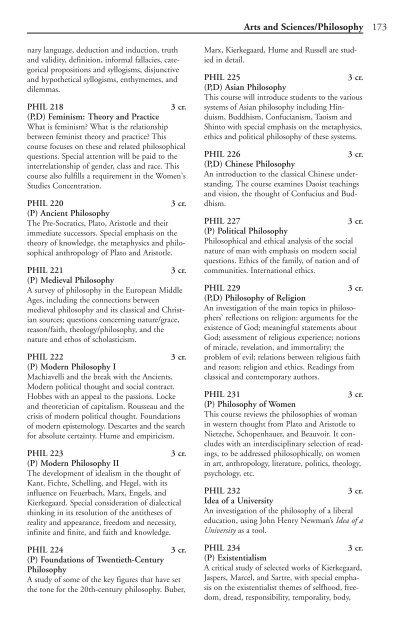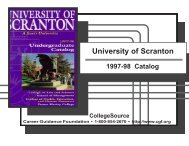2003-2004 - The University of Scranton
2003-2004 - The University of Scranton
2003-2004 - The University of Scranton
Create successful ePaper yourself
Turn your PDF publications into a flip-book with our unique Google optimized e-Paper software.
nary language, deduction and induction, truth<br />
and validity, definition, informal fallacies, categorical<br />
propositions and syllogisms, disjunctive<br />
and hypothetical syllogisms, enthymemes, and<br />
dilemmas.<br />
PHIL 218 3 cr.<br />
(P,D) Feminism: <strong>The</strong>ory and Practice<br />
What is feminism? What is the relationship<br />
between feminist theory and practice? This<br />
course focuses on these and related philosophical<br />
questions. Special attention will be paid to the<br />
interrelationship <strong>of</strong> gender, class and race. This<br />
course also fulfills a requirement in the Women's<br />
Studies Concentration.<br />
PHIL 220 3 cr.<br />
(P) Ancient Philosophy<br />
<strong>The</strong> Pre-Socratics, Plato, Aristotle and their<br />
immediate successors. Special emphasis on the<br />
theory <strong>of</strong> knowledge, the metaphysics and philosophical<br />
anthropology <strong>of</strong> Plato and Aristotle.<br />
PHIL 221 3 cr.<br />
(P) Medieval Philosophy<br />
A survey <strong>of</strong> philosophy in the European Middle<br />
Ages, including the connections between<br />
medieval philosophy and its classical and Christian<br />
sources; questions concerning nature/grace,<br />
reason/faith, theology/philosophy, and the<br />
nature and ethos <strong>of</strong> scholasticism.<br />
PHIL 222 3 cr.<br />
(P) Modern Philosophy I<br />
Machiavelli and the break with the Ancients.<br />
Modern political thought and social contract.<br />
Hobbes with an appeal to the passions. Locke<br />
and theoretician <strong>of</strong> capitalism. Rousseau and the<br />
crisis <strong>of</strong> modern political thought. Foundations<br />
<strong>of</strong> modern epistemology. Descartes and the search<br />
for absolute certainty. Hume and empiricism.<br />
PHIL 223 3 cr.<br />
(P) Modern Philosophy II<br />
<strong>The</strong> development <strong>of</strong> idealism in the thought <strong>of</strong><br />
Kant, Fichte, Schelling, and Hegel, with its<br />
influence on Feuerbach, Marx, Engels, and<br />
Kierkegaard. Special consideration <strong>of</strong> dialectical<br />
thinking in its resolution <strong>of</strong> the antitheses <strong>of</strong><br />
reality and appearance, freedom and necessity,<br />
infinite and finite, and faith and knowledge.<br />
PHIL 224 3 cr.<br />
(P) Foundations <strong>of</strong> Twentieth-Century<br />
Philosophy<br />
A study <strong>of</strong> some <strong>of</strong> the key figures that have set<br />
the tone for the 20th-century philosophy. Buber,<br />
Arts and Sciences/Philosophy 173<br />
Marx, Kierkegaard, Hume and Russell are studied<br />
in detail.<br />
PHIL 225 3 cr.<br />
(P,D) Asian Philosophy<br />
This course will introduce students to the various<br />
systems <strong>of</strong> Asian philosophy including Hinduism,<br />
Buddhism, Confucianism, Taoism and<br />
Shinto with special emphasis on the metaphysics,<br />
ethics and political philosophy <strong>of</strong> these systems.<br />
PHIL 226 3 cr.<br />
(P,D) Chinese Philosophy<br />
An introduction to the classical Chinese understanding.<br />
<strong>The</strong> course examines Daoist teachings<br />
and vision, the thought <strong>of</strong> Confucius and Buddhism.<br />
PHIL 227 3 cr.<br />
(P) Political Philosophy<br />
Philosophical and ethical analysis <strong>of</strong> the social<br />
nature <strong>of</strong> man with emphasis on modern social<br />
questions. Ethics <strong>of</strong> the family, <strong>of</strong> nation and <strong>of</strong><br />
communities. International ethics.<br />
PHIL 229 3 cr.<br />
(P,D) Philosophy <strong>of</strong> Religion<br />
An investigation <strong>of</strong> the main topics in philosophers’<br />
reflections on religion: arguments for the<br />
existence <strong>of</strong> God; meaningful statements about<br />
God; assessment <strong>of</strong> religious experience; notions<br />
<strong>of</strong> miracle, revelation, and immortality; the<br />
problem <strong>of</strong> evil; relations between religious faith<br />
and reason; religion and ethics. Readings from<br />
classical and contemporary authors.<br />
PHIL 231 3 cr.<br />
(P) Philosophy <strong>of</strong> Women<br />
This course reviews the philosophies <strong>of</strong> woman<br />
in western thought from Plato and Aristotle to<br />
Nietzche, Schopenhauer, and Beauvoir. It concludes<br />
with an interdisciplinary selection <strong>of</strong> readings,<br />
to be addressed philosophically, on women<br />
in art, anthropology, literature, politics, theology,<br />
psychology, etc.<br />
PHIL 232 3 cr.<br />
Idea <strong>of</strong> a <strong>University</strong><br />
An investigation <strong>of</strong> the philosophy <strong>of</strong> a liberal<br />
education, using John Henry Newman’s Idea <strong>of</strong> a<br />
<strong>University</strong> as a tool.<br />
PHIL 234 3 cr.<br />
(P) Existentialism<br />
A critical study <strong>of</strong> selected works <strong>of</strong> Kierkegaard,<br />
Jaspers, Marcel, and Sartre, with special emphasis<br />
on the existentialist themes <strong>of</strong> selfhood, freedom,<br />
dread, responsibility, temporality, body,
















